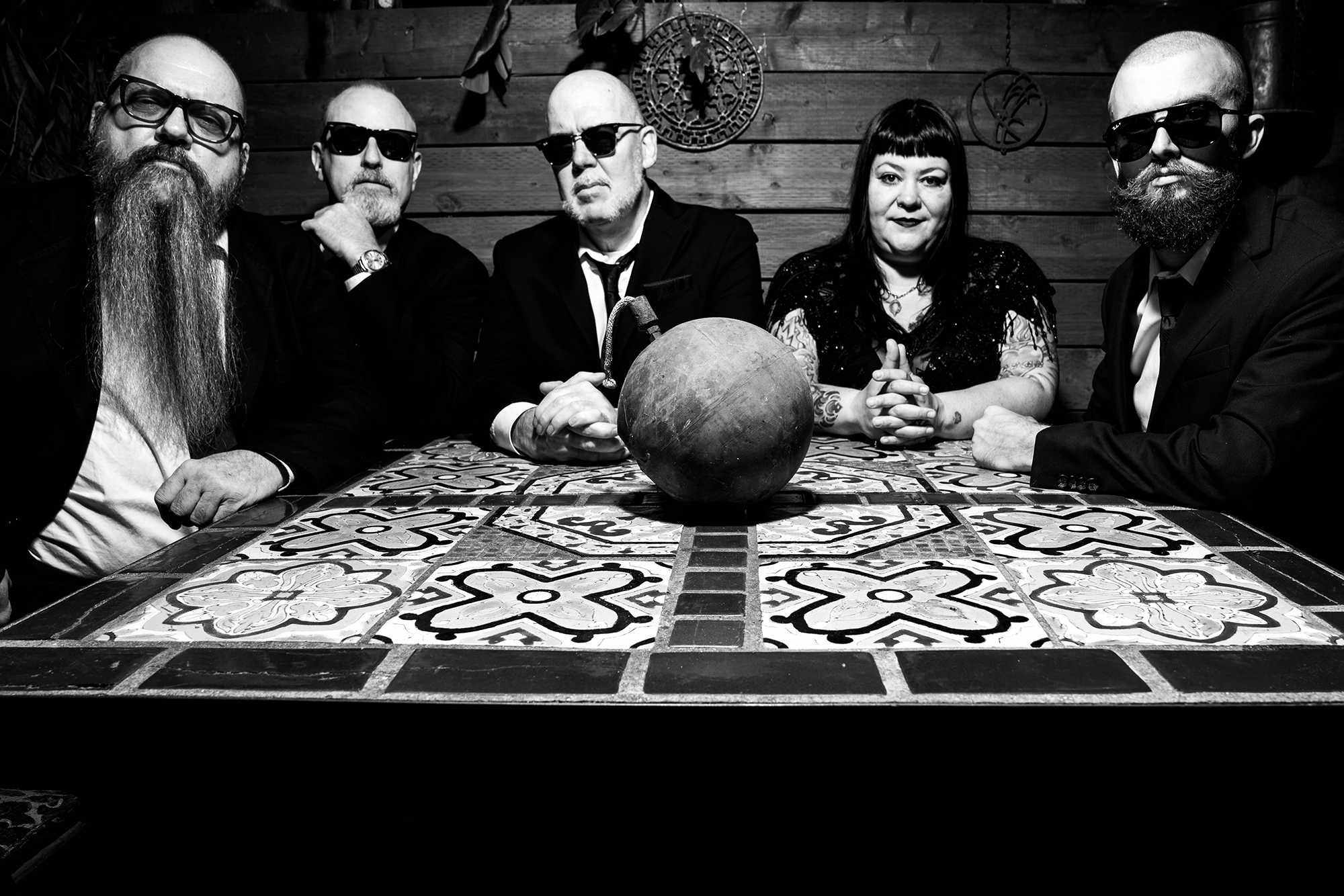By Keith Walsh
Surf punk band The Balboas was formed in the late 90s when three graduate students in psychology had a chance encounter with surf guitar legend Dick Dale. Now all PhDs in organizational psychology, Mark Healy (vocals), Rick Frei (rhythm guitar) and Rich Griffith (lead guitar) balance their duties as professors with their musical calling, bringing their unique brand of rock and roll to crowds in the U.S. and Europe with Caitie O’Shea (bass) and Dusty Watson (drums). In our interview on the release of their brand-new star-studded set The Pandemic Singles, Griffith and I discuss topics ranging from the value of punk rock, the importance of authenticity, and controversies around diversity in the workplace. (My review of The Pandemic Singles is at PunkRockBeat.com.)
Popular Culture Beat: So you, Rick, and Mark met while studying at the University of Akron?
Rich Griffith: Yeah, we went to the University of Akron together and were getting PhDs. And I think Rick was a year ahead of me. Mark might have been ahead of me too, something like that.
Popular Culture Beat: Cool, and y’all bonded – did you already have your own instruments or did you can say ‘I’ll play the guitar you play this, and so on?’
Rich Griffith: I was playing drums in another punk band and then Mark was getting a project off the ground and he needed a drummer. So I sat down with him, until they kind of got that up and running. Rick, I think at the time was playing keyboards and then switched over to guitar and started playing with us a little bit, too.
Popular Culture Beat: On the first song, “Insanity Pepper,” are you calling out Jello Biafra?
Rich Griffith: No, I wouldn’t do that to him.
Popular Culture Beat: Okay, no. But he could take it. He likes that kind of stuff.
Rich Griffith: Yeah, he likes to play rough.
Popular Culture Beat: In addition to legends Dave Wronski, Jimmy Dale and Dusty Watson, ‘The Pandemic Singles’ features East Bay Ray (Dead Kennedys), Dez Cadena (Black Flag), Mike Palm (Agent Orange), and Kitten Kuroi (Billy Idol). Did you meet all these all these other stars touring –as you guys have been together for almost 30 years?
Rich Griffith: Yeah, we’ve been together a long time. So you get to know people from the road, you know, you play shows with them or something like that and then it doesn’t hurt when Paul Roessler is producing your stuff, Paul knows everybody under the sun. So when you say, ‘it would be great if we could record this person.’ Paul, of course within two seconds says, ‘well, yeah. I know him, I recorded this album with him. Do you want me to ask them?’ And I said, ‘yeah, that’d be great.’ A lot of them said yes. It’s just been fantastic.
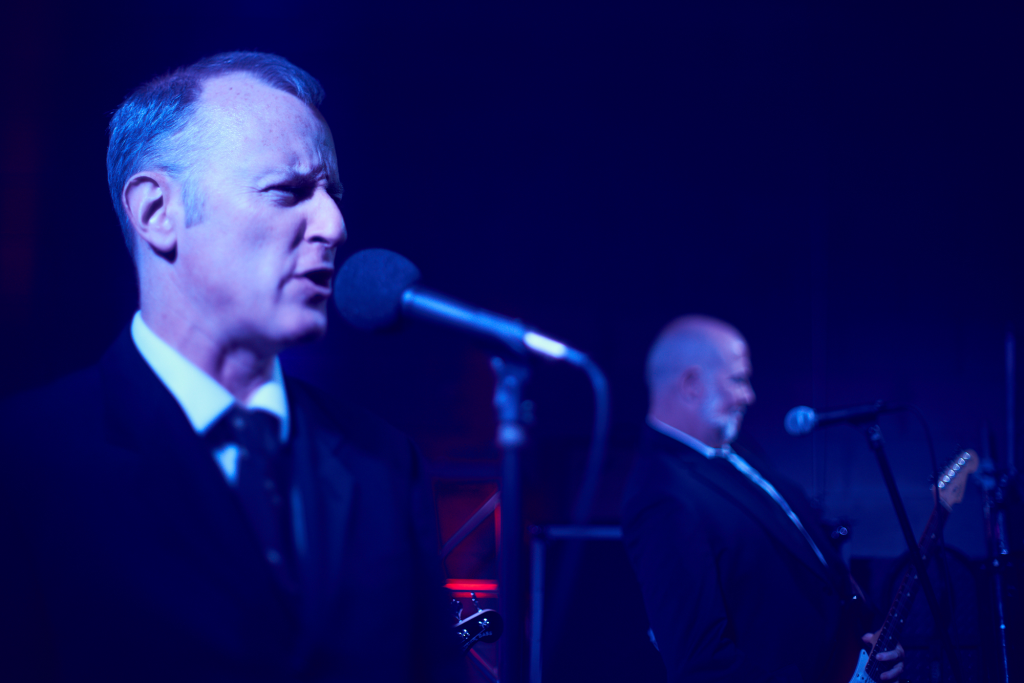
Popular Culture Beat: So, with The Pandemic Singles, this was your first experience recording an album remotely, is that correct?
Rich Griffith: Yeah. Actually we’ve been recording the same way for 20 years and then when the pandemic hit as you know, it just disrupted everything you couldn’t do anything. So I gave Paul a call and said ‘how hard would it be you know? What would the workflow look like?’ So we talked through it and it wasn’t it anything too much crazier than what we were doing already. We were sending a demos to each other and all that. We just got them into a more final form, and then everybody would add their track and send it to Paul. Paul would mix it and then we’d send that around a little bit until it was ready to go and then out the door it would go.
“Punk rock is an outlet that for a long time was available to anybody, and still can be — it’s just not as prominent as it once was. But it allows you to amplify your voice and you can say whatever you want and no one can stop you from saying it — and it’s really powerful, and I think once people experience that it’s difficult for them to put that back.”
Rich Griffith Of The Balboas
Popular Culture Beat: Is this the preferred method now or you would rather work in a studio?
Rich Griffith: I still like the studio. I mean, there’s something about the creativity that’s happening in the moment that is superior and it’s just more fun — these are all my friends. I don’t see them all that much. We live all over the United States. So I run into them a couple times a year.
Popular Culture Beat: Okay, so I saw a video recently, for “Escape To Youngstown,” where you have a Dan Electro guitar.
Rich Griffith: Yeah. I got a Dan Electro. So it depends on what I’m playing like, you know, mostly I’m a Strat guy and I think that just came from listening to Dick Dale. But I play a lot on a Jag — that’s my guitar that sits at my right hand, if you will. Dave Wronski, a friend of mine built it, he works out at the (Fender) Custom Shop and he built that guitar, but that Dan Electro is trashy. It’s just noisy and trashy, so if you’re getting into garage or a rabid punk sound and stuff, it’s really hard to beat the Dan Electro.
Popular Culture Beat: Tell me about your amp? You must have a tube amp. Tell me you have a Fender Twin?
Rich Griffith: Yeah, I’ve got a number of amps, The one that I probably play through the most, like my bread and butter, is called a VibraSonic. It’s like a Twin but it’s a one fifteen, It’s just a brutal amp. It’s just a really powerful amp, but for years when I toured, I toured with a Dual Showman through a double two fifteen and a Fender reverb unit. And that’s just a lot of stuff to carry, You know, so I had very traditional kind of gear.
Popular Culture Beat: Musicians have to make a tough decision, because some of the digital amps, like the Boss Katana, are pretty adequate and so much lighter.
Rich Griffith: I mean you can digitally model now and no one will know. Someone might say they know but they don’t. It’s pretty good. Now do I play through the traditional gear? Yeah, I do. I’m a sucker for it. But am I sorry that I did that after the end of tour? Yeah, I’m f*&king sorry. I’ve been carrying around 300 pounds of stuff.
Popular Culture Beat: Reverb is so important to the surf rock sound and surf guitar. You said you used a traditional Fender reverb unit. Was that a rack mount device?
Rich Griffith: That’s a traditional Fender tank. It’s just the old school 1963 tank.
Popular Culture Beat: It’s got springs in it.
Rich Griffith: Yeah. Yeah.
Popular Culture Beat: Let’s get into the album. It’s a twist there — Jimmy Dale is on drums on some songs?
Rich Griffith: He plays drums and guitar. I don’t think he plays drums and guitar on the same song, but some songs drums, some songs guitar.
Popular Culture Beat: He’s a lead guitarist like his dad. Did you ever think, ‘oh no, the pressure is on, I’m performing for Jimmy Dale?’
Rich Griffith: No, we’ve known Jimmy – Jimmy is the start of The Balboas. This is a crazy sidenote, but years ago, my car broke down, and I was with the guys that are in The Balboas. We were out seeing a Dick Dale show. My car breaks down and I say ‘wouldn’t it be great if Dick Dale pulled over and helped us out?’ And sure as shit, he did. This RV pulls over and Jimmy Dale’s head is sticking out the window, shaggy hair waving. And Dick was really cool, and took care of us. And that was the exact point that I said ‘it’s time. It’s time to become a surf band now. That’s a sign from God.’
Popular Culture Beat: When was the first time you played with him after he helped you with your car?
Rich Griffith: We played with Dick Dale in Cleveland in 98. Which is where we met Dusty Watson.
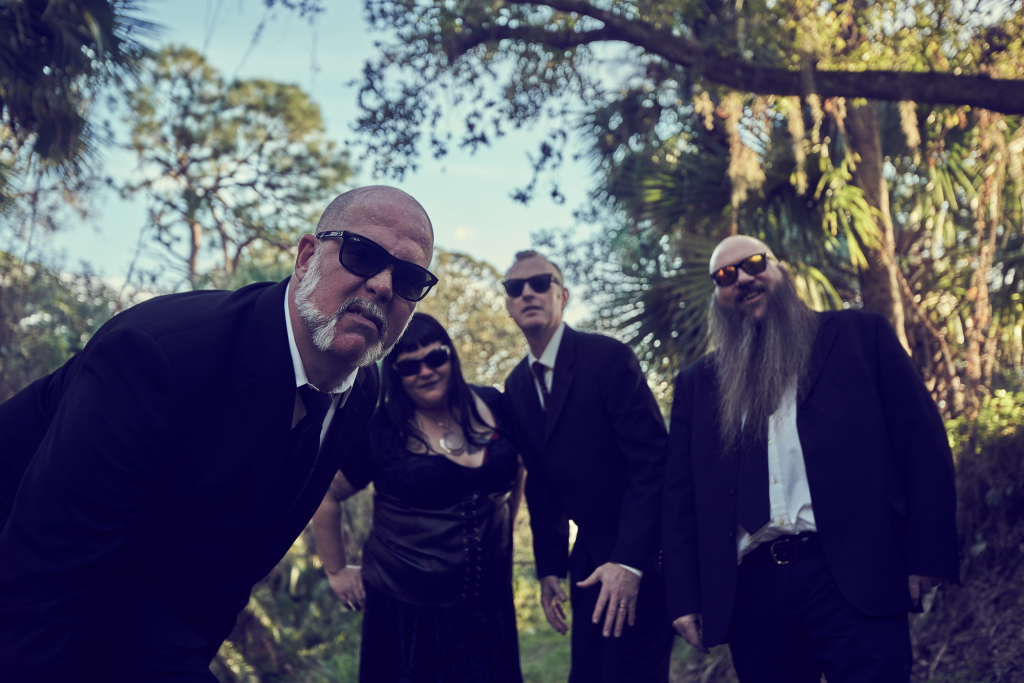
Popular Culture Beat: I grew up in Southern California, and we were always aware that surf music kind of started over there in Huntington Beach, and you had the Beach Boys from Garden Grove. You guys must have a big following in California?
Rich Griffith: Oh yeah–the West Coast is where our friends are, and kind of where we’re based now. You’re kind of based where your drummer is. Dusty Watson is our drummer and he’s playing in damn near every band in L.A. If it’s got a surf or punk sound, Dusty’s in it.
Popular Culture Beat: The sound of The Balboas is kind of a sendup of surf with some spy themes in the melodies of the guitar, and horror and punk all together.
Rich Griffith: Yeah, I would say that it’s surf punk. Or punk surf, depending on how people want to stack up their adjectives. It’s like if you took Dick Dale and Agent Orange and split the middle, that’s kind of where we’re at because there is a you know, there’s a vocal element to it that is irreverent and often pretty course, but you know as you listen to it, it’s Dick Dale man. It’s just drunker and faster.
Popular Culture Beat: What’s the obsession with darkness, like evil institutions, bad characters – why are you projecting that out? What’s the reason?
Rich Griffith: I think with The Balboas you got a couple of things that sneak through there. There is that sort of dark element to it. And I think some of that is just the people that are in the band. They’re leather-wearing, kind of hard folks. Even though they’re playing what’s traditional surf music, that hardness comes out. And then when Mark adds his lyrics, it just multiplies. It just multiplies itself.
Popular Culture Beat: Punk rock gives people a space to be defiant. It’s a place that people can go, and get visibility. Please explain why this kind of defiance is important and necessary.
Rich Griffith: That’s a good question. I mean, I think some of it is that people want to have a voice — they want to be heard and sometimes they are not being heard and that sh@t gets old. So it starts to build up and then you find outlets for it, and punk rock is an outlet that for a long time was available to anybody, and still can be — it’s just not as prominent as it once was. But it allows you to amplify your voice and you can say whatever you want and no one can stop you from saying it — and it’s really powerful, and I think once people experience that it’s difficult for them to put that back.
Popular Culture Beat: That’s awesome. Yeah, it’s not that hard to play a few chords, you know? To make something so you go, ‘Wow, it’s really good. This is what I feel,’ you know, you can share it.
Rich Griffith: Yeah, I mean my son is a musician. He’s really trained very well, you know, theoretically and he’ll ask me ‘what note are you playing, or what chord are you playing?’ and I’ll just say like, I don’t know. It just sounds good.’ I think that’s punk rock when you’re playing what you’re feeling.
Popular Culture Beat: Is there a fear that maybe by modeling this kind of defiance that you’re going to encourage people to go too far, or to think they can say anything anytime?
Rich Griffith: I don’t care, that’s up to them. I don’t worry about that. I mean, we’re just doing our thing and having fun and you know, wherever you take your music is up to you man. It’s not like we’re inciting violence are doing anything crazy.
Popular Culture Beat: Before I ask you about some of the lyrics, who does the amazing artwork for The Balboa’s albums?
Rich Griffith: Phred Rawles. Phred’s been doing our artwork forever. Phred’s a good dude.
Popular Culture Beat: It kind of ties it together in the package with the themes of darkness, and then you have like something like ‘Never Stay Dead.’ That’s kind of a voodoo theme, but I’m also thinking resilience.
Rich Griffith: That’s funny. I didn’t think about that. So it’s got a weird origin. A few years ago, I died….and I luckily I got resuscitated and all that stuff and Caitie (bassist Caitie O’Shea) and I were just on the phone kind of joking about it after you know, everything that happened, and one of us said ‘never stay dead,’ sure enough we jot that down.
Popular Culture Beat: Wow, you don’t have to go into detail, but it was probably a heart condition.
Rich Griffith: Yeah, that’s totally what it was. I had a stroke, and I had to get a couple of heart surgeries, and it went sideways. So this album has all those kind of strange themes, and they stack up in a weird way where there’s a lot of death, and you know, it was a lot of that going on during that period of time.
Popular Culture Beat: Well, yeah the best songs come from personal experience. ‘The Impaler’ is followed by ‘Penetration’ which to me is like a morality message, like ‘don’t mess with her.’ And there’s ‘Angel Lust.’
Rich Griffith: Yeah, but “Angel lust” is a fun one because that’s got Kitten Kuroi who’s doing the vocals on that — Kitten is Billy Idol’s background singer. She’s just fantastic. Oh my God. I don’t think I’ve ever met anybody who’s got a better set of pipes than Kitten.
Popular Culture Beat: You’ve got a couple of songs about psychoactive formulas – ‘Insanity Pepper’ and ‘Karrot Water Mind Kontrol.’
Rich Griffith: Yeah, we were going to do this spy EP, when the pandemic had hit, we had had a plan to put this together, and there was a story we were going to weave through it. And that was part of that narrative. I’m glad. This worked out even better, because they’re just strange now, they stand out as weird tunes.
Popular Culture Beat: On punkrockbeat.com, I’ve been tagging ‘positive punk.’. As a psychologist, you probably know about this trend, of positive psychology. It’s very constructive. Actually, it’s probably used in corporate environments and in personal growth, from mindfulness to gratitude practices.
Rich Griffith: Well, I’m not a fan or a detractor of the positive movement. Just in general I think it’s good to be authentic and be genuine. So if you’re a positive person great. Have at it. If that’s not really you then, you know, then you’re then you’re faking it. I don’t really see that as being a positive either. l just like to see people be authentic.
Popular Culture Beat: I saw that many of your publications in organizational psychology are about the topic of faking. What are people faking in job applications and interviews?
Rich Griffith: Usually they’ve got some kind of personal derailleur that they’re hiding, you know, so you got someone who is lazy or they’re sloppy or something. So they’re just trying to present the best version of themselves. But some people just flat-out lie, you know, they say they got a degree from Harvard when they don’t have a degree at all, you know. So one’s exaggerating, the others bullshitting and you know, I worry more about the second one. If you’re lying to me then you’re going to lie to me later.
Popular Culture Beat: Yeah, it’s about integrity, which I hate that word because it’s so misused, but yeah. So organizational psychology is about making environments more adaptive, and flexible, while keeping people in line. How do you find yourself championing organizations that are stable, clean and safe, and then on the other hand, punk, which is wild and crazy. How do you walk these two worlds?
Rich Griffith: They’re really handy skills to have, because you’re right. When you get on stage, you’re just cutting loose and you know, whatever happens, happens. But you got to get to stage and that means you had to leave a city the night before on time with your gear stood up and nothing got stolen. So there’s an organization that you have to have, to be able to get on the road and just cut loose. And what we do is just turn that on and off like a light switch. So the Balboas were super-efficient at loading in or loading out or they’re super-efficient in the studio. They really work super-super hard, but they also will f$#k off just as hard, you know, they just turn the switch. But they’re very good at being organized to get to whatever it is that we have to do. They’re a super professional outfit.
Popular Culture Beat: Yeah, people have to remember it’s business first of all, and yeah, the idea you can have fun and party all the time and be a millionaire –there’s the wrong myth that people get when they’re starting out, about music in general.
Rich Griffith: You can do all that stuff. I mean, but it’s work. You know, it’s serious work. Now the technology has changed it a lot, so you can be in the tour van and be on a cell phone and calling someone and you could be you know, fixing your website all on the fly. Where is it used to be like in the analog world, man, you had to get all that sh@t done ahead of the tour and It was it was a lot of work to go on a tour.
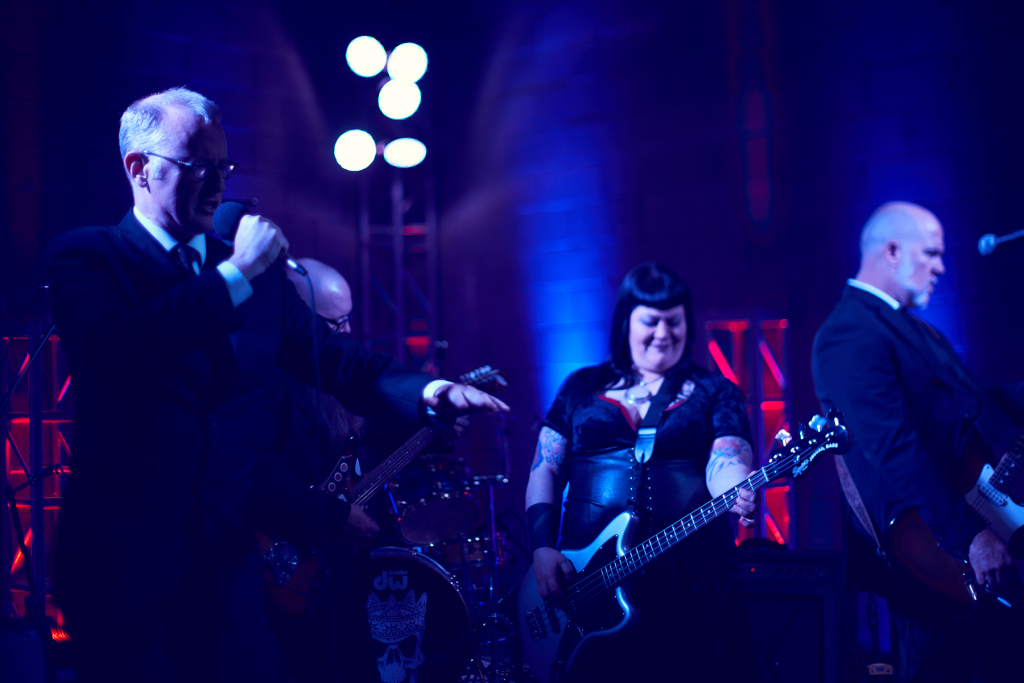
Popular Culture Beat: Tell me about some of the other members, you have Caitie O’Shea.
Rich Griffith: So, Caitie O’Shea is a fantastic bass player, really one of the best you can find. I’ve known her now for 25 years, she joined The Balboas really early, we were only weeks into it. She has a very storied music career, has been in a number of bands. She works in a theater and Akron so is just big part of the punk rock scene in in Akron.
Rick Frei was my roommate in grad school. Rick is our rhythm guitar player. He’s one of the first Balboas, he’s the guy who came up with the name with for the band. He’s a professor at a community college in in Philly. Been there now for 20 plus years Mark Healy, who is the vocalist for the band is also one of the original Balboas. I’ve known Mark, you know, ever. since I moved to Akron. He was in a band called Creepy Neighbor. So I was seeing him play, you know, I’d run into him out in the music scene and then Dusty Watson as I mentioned is our drummer. Dusty’s been with the band since 2006. and he you know, he drummed for Dick Dale, he drummed for Agent Orange, he drummed for the Sonics. So the guy just knows everybody under the sun and he is the best drummer in the world, really phenomenal.
Then most recently, Jimmy Dale has come on board and the way that works, sometimes Dusty’s on tour like he’s off on tour with Nashville Pussy. Well then Jimmy might be sitting in on drums. If we need a guitar track, well Jimmy’s just as good as his old man, if not better.
Popular Culture Beat: That’s interesting that you have these people you can plug in and they’re all top notch.
Rich Griffith: Oh man. Yeah. I mean he is he is great and you know, he’s part of the family if you will. The surf community in California is relatively small you get to know all these people if you’ve been hanging out for a while. It’s just great to have all those folks playing in The Balboas and then all the connections that they bring which is really, really great.
Popular Culture Beat: For a lot of people growing up in the 80s like myself, punk rock came out and we thought “wow, this is different.’ Tell me how punk rock hit you in the face when you were growing up?
Rich Griffith: Yeah, so I come from Youngstown, Ohio. The punk there is really aggressive and dirty. So it’s got the East Coast punk vibe rather than the slick stuff that you hear out west. The stuff that grabbed me was sort of the West Coast punks, Agent Orange in particular. Like I just was blown away the second I heard them. And I don’t even think I had listened to a lot of surf, but all of a sudden — that guitar tone is just nuts, so just like you, you know bowled over by the sound.
Popular Culture Beat: You said ‘slicker on the West Coast’ but that’s my backyard. Agent Orange, Social Distortion. TSOL. They’re like corporate guys.
Rich Griffith:Yeah. It’s changed a bit. I mean, all punk now is pretty slick. If you listen to, you know, when The Ramones came out. That was the most aggressive guitar I’d ever heard in my life. Now it sounds bubblegum pop.
Popular Culture Beat: Particularly when Phil Spector produced them.
Rich Griffith. Yeah, it changes quite a bit.
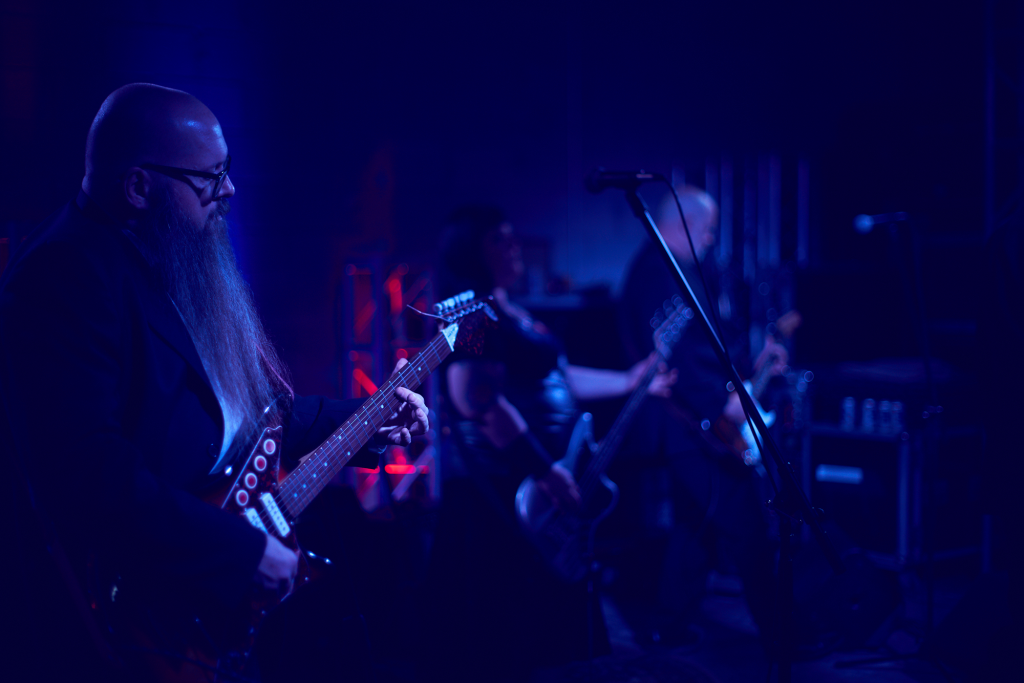
Popular Culture Beat: I think you said Mark came up with the name, The Balboas?
Rich Griffith: Rick did.
Popular Culture Beat: That’s like a colonial reference but also surfing. So it’s perfect.
Rich Griffith: Yeah, it worked out pretty well. People tended to associate it with Philly because that’s where Rick was, and a lot of the Articles were coming out — but it has nothing to do with it. It’s really geared towards, you know, the what is the California surf scene and then Rick’s great-uncle is you know, really well-known surfer who put together a like a surf club. if you will, called the Balboa Boys, so it was kind of a nod to his family, too.
Popular Culture Beat: So wait, what about Philly? How does it tie to Philly at all in any way?
Rich Griffith: It doesn’t really tie into Philly. It has nothing to do with Rocky Balboa.
Popular Culture Beat: Philadelphia. I haven’t seen that movie yet. ‘Rocky.’ People don’t believe it.
Rich Griffith: Yeah. People do they tend to think that it’s associated with it because we had a run where The Balboas were kind of based out of Philly in the early 2000s.
Popular Culture Beat: Okay, so there’s no sugary sweet songs in your discography — you got absurdity, caricature, and satire. Is that accurate?
Rich Griffith: Yeah, and there is a –I wouldn’t call it physically violent — it’s just a musically violent element to it that you know, that just doesn’t allow for much sweetness to come in there. So it’s just punk rock, you know? Yeah. I don’t know too many sweet punk rock songs.
Popular Culture Beat: Unless it’s that genre emo punk or something like that.
Rich Griffith: Yeah, I have no need for that.
Popular Culture Beat: What do you feel like doing moving forward for like in terms of new songs? You guys are probably working on something already.
Rich Griffith: Yeah, we are — so we’ve got our releases are stacked up until the fall of next year, but we have what is a full-length release that we’re working on now, so I’ll start getting those songs kind of put together and get them passed around, and then we’ll get together and there’s a chance that this could be a live album. So we have maybe a year before will record that.
Popular Culture Beat: That will be fantastic, the energy of a live recording, like the lightning in a bottle you can capture on that.
Rich Griffith: Yeah, it’s nice. We haven’t done one in a while, you know, we did a live album on our European tour some years ago and it was it worked out great. I loved it. It’s one of the better sessions that we had so it would be nice to try something like that again.
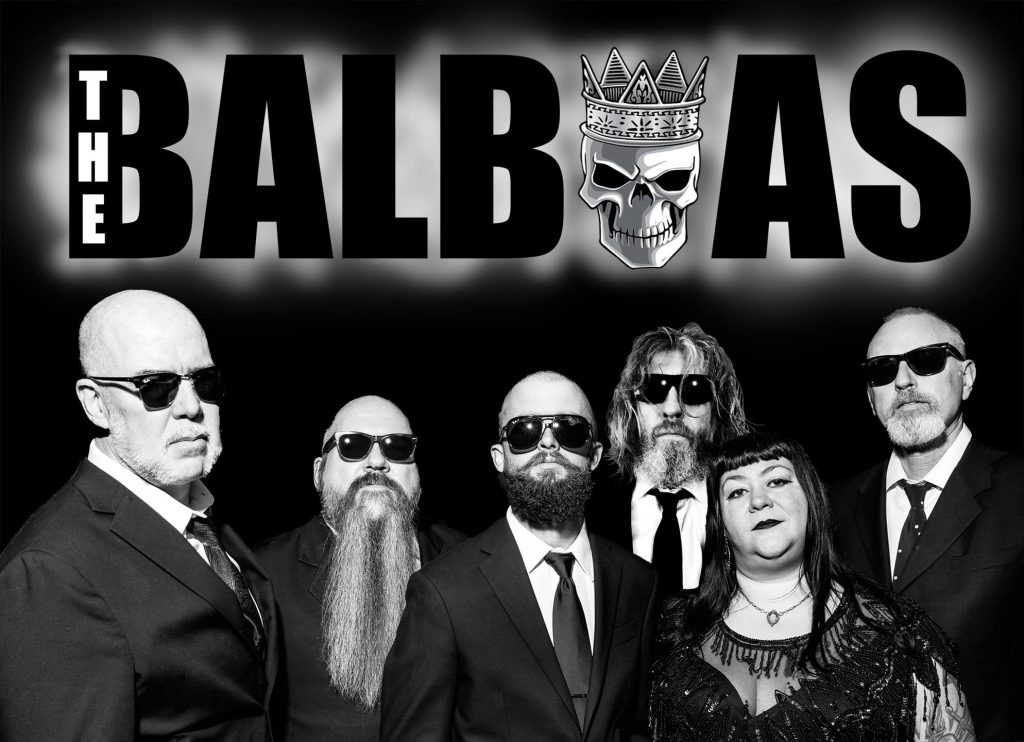
Popular Culture Beat: How do you personally balance touring and professing, you know teaching?
Rich Griffith: It works okay. I travel a lot for my work, you know, I’m out of the country maybe once a month. So the balance — usually it’s like during the breaks and during the summers. Then if I have some big things to do, I can work on them then. So if we’re going to do some recording I’ll go out to L.A. for a couple weeks in the summer and we’ll get some of that done, or if we’re going to do a photoshoot or something. But there’s breaks in my job. I could take a break anytime. That’s the cool part about being a professor.
Popular Culture Beat: Yeah, it seems like the other professors would have similar schedules, three of the core members, and you’ve got the other two.
Rich Griffith: So yeah, we’re pretty flexible. So, you know, it’s not like we got a nine to five job and we gotta make it work.
Popular Culture Beat: You have a textbook that’s used in international organizations. I saw it on Amazon.
Rich Griffith: Yeah.
Popular Culture Beat: Wow. What are some current issues in organizational psychology, new ones, and also some of the classic issues?
Rich Griffith: One of the big things you’re seeing companies struggle with now is how to handle diversity. You know, there are such a variety of different ways that people are coming into the workplace and they’ve all got different attitudes, and that’s a challenge if you want to try to get things done and so you got to manage that well, Well and in some places that’s easy to do, and in some places that’s not. You know in Florida right now, they’re making a big deal out of that in some places. You know, we’re not the only place. There are plenty of places in the country where diversity is kind of a dirty word. But that would be a big issue that we’re trying to square away and then the other one right now, you probably heard this term called ‘quiet quitting’ or people start leaving the workforce. There just aren’t enough people to fill jobs right now and there’s not going to be for 15 years.
Popular Culture Beat: So not just the high skilled jobs but in service jobs as well?
Rich Griffith: Across the board, there’s a shortage everywhere. But it’s going to be particularly bad obviously where the pay is not very good, and where it’s stressful. So service jobs will be, you know, one of those areas where people will just say ‘I’m done. I’m not doing this anymore.’
Popular Culture Beat: Diversity is very interesting because you have business environments, where they deal with so much financial stuff that they tend to be conservative, but diversity is kind of a program where you want people to be more open-minded. So they clash a lot.
Rich Griffith: I mean in general what you want to do is, you know, you got a job to do you got things you got to do, and if you’re letting this diversity get in the way, then that’s money that’s going down the toilet. So, okay, there is the you know, let’s hold each other’s hands and do it because it’s the right thing to do approach. You could do that but we always approach it in that, ‘you got a job to do, you got things you got to do, let’s get it done and let’s get these things that are bugging you out of the way and you can you can do the right thing and be productive too.’ But we tend to focus on productivity.
Popular Culture Beat: Oh, wow. Okay. So that’s more of a conservative approach.
Rick Griffith: Yeah, probably. I’ll say it’s aligned with business, you know, we’re not doing it just to hug each other.
Popular Culture Beat: Yeah, that’s a good point. But on the other hand, well, then you get to the question ‘what’s the responsibility of companies to create jobs for the community regardless of who they are?’
Rich Griffith: Yeah. I mean that’s a whole societal question that you have. What is the role of business in modern society — and that’s pretty complex in the United States, pretty integral.
Popular Culture Beat: It works pretty well for someone like Starbucks. You see all kinds of folks working there, I go in there, I like the vibe.
Rich Griffith: Yeah. Yep. I mean they’ve got what is a pretty progressive company culture that, you know, not only allows for that kind of behavior, but it encourages it.
Popular Culture Beat: Yeah, super cool. Thank you very much for your time today.
Rich Griffith: Thanks for reaching out.
Popular Culture Beat: It’s my pleasure, Rich. Have a good weekend.
‘The Pandemic Singles’ on Bandcamp
The Balboas dot com
The Balboas on Facebook
The Balboas on Instagram
Phred Rawles Instagram
Review Of ‘The Pandemic Singles’ At PunkRockBeat.com
finis

